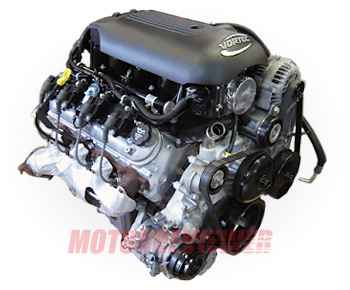GM 5.3L Vortec LM7/L59/L33 Engine Specs, Problems, Reliability, Info

5.3L Vortec 5300 Gen3 Small Block V8 Info
The Vortec 5300 engine, or LM7/L59/LM4/L33, is a naturally-aspirated 5.3-liter gasoline V8 truck engine. The first member of the Vortec 5300 lineup, introduced in 1999, was the LM7. Basically, it was a stroked version of the 4.8-liter LR4 Vortec 4800 engine. Later, the lineup of 5.3-liter third-generation Vortecs expanded with various versions, including all-aluminum V8s and flex-fuel capable models. These motors were widely used in many popular Chevrolet and GMC vehicles, including the Chevrolet Silverado and GMC Sierra pickup trucks, the Chevrolet Tahoe, Suburban and the GMC Yukon SUVs, and even the Chevrolet Express/GMC Savana vans. Thus, the name "Vortec 5300" refers to a range of engines. Let's take a closer look at the specific engine code to see what lies behind them.
Vortec 5300 Engine Overview
LM7 Engine
The GM LM7 is the first Gen III 5.3L Vortec, which features cast iron block and OHV aluminum heads with two valves per cylinder, "cathedral" intake ports and oval exhaust ports. The LM7 block comes with a cast iron crankshaft, 6.098 inch-long powdered metal I-beam connecting rods, and dished-style cast aluminum pistons. The valvetrain features hydraulic roller lifters, die-cast roller rocker arms, and 7.385-inch long pushrods. Intake valve diameter: 1.890 inches (48 mm). Exhaust valve diameter: 1.550 inches (39.4 mm). The stock camshaft has the following specs: 191/190 duration (intake/exhaust), 0.457 in./0.466 in. valve lift (intake/exhaust).
The LM7 engine features electronic port fuel injection and a truck-style intake manifold with a 3-bolt, 78 mm throttle body. 1999–2002 models were equipped with a cable operated throttle, while newer models mostly have a drive-by-wire system. All LM7 engines come with electronic ignition systems and individual coils. The power output lies in a range of 270-295 hp (201-220 kW) and 315-335 lb-ft (427-454 Nm) torque.
LM4 Engine
The LM4 is essentially an equivalent to the standard LM7, but it has an aluminum block with cast-in cylinder liners instead of an iron block. This kind of lightweight version of the LM7 was manufactured a couple of years only and used on some GM mid-size SUVs, such as the Chevrolet TrailBlazer, Chevrolet SSR, and the GMC Envoy. This Vortec 5300 motor made 290 horsepower and 325 pound feet of torque.
L59 Engine
The L59 motor (2002-2007) is a Flex Fuel version of the LM7. It features different injectors for E85 compatibility, a mixture of 85% ethanol and 15% gasoline, that Flex-Fuel Vehicles (FFVs) can use to run on.
L33 Engine
The L33 is an aluminum-block Vortec 5300 HO (high output) version. It shares an aluminum cylinder block from the LM4 and uses 799 cylinder heads with "cathedral" intake ports (similar to the LS6 or LS2). It also features larger diameter intake valves (2.00 in / 50.8 mm), flat-top pistons for higher compression (9.9:1), and a unique camshaft with 193/193 duration and 0.482 in. valve lift for both intake and exhaust valves. The L33 HO engine produces 310 hp (230 kW) and 335 lb-ft (454 Nm), which makes it the most powerful 5.3-liter Gen III small block truck V8 motor.
Engine Specs
St. Catharines, Ontario, Canada
Aluminum (LM4/L33)
9.9:1 (L33 HO)
390 lbs (177 kg) - LM4
Oil recommendations and capacity may vary depending on the car model, year, and market. Please check the service manual specific to your vehicle!
Gen III Vortec 5300 Engine Reliability and Problems
Iron block 5.3 L Vortec V8 LM7 and L59 are true workhorses. These engines are highly reliable and durable. The all-aluminum versions are also widely considered to be good and trouble-free. The Gen 3 small block engines do not have AFM (Active Fuel Management) or VVT (Variable Valve Timing), which known for some issues in later generations, like lifter failures and oil consumption. However, nothing is perfect, and the third generation is not an exception. Here are some of the most common problems with these 5.3 Vortec engines.
Fuel Pressure Regulator Failure
A faulty fuel pressure regulator (FPR) is very common for the Gen.3 Vortecs. The FPR is responsible for controlling how much fuel the injectors inject, ensuring an optimal air to fuel ratio for the right operation. Common symptoms of a bad fuel pressure regulator include misfires, rough idling, stalling, fuel smell, black smoke, and fouled spark plugs.
Cracked Cylinder Heads
There is a bulletin for a cracked head that causes coolant loss without a visible leak on the LM7, L33 and L59 engines. Some cylinder heads manufactured by Castech may develop porosity cracks in a specific area, leading to gradual coolant loss over time.
Weak Intake Manifold
On the gen3 Vortec, the plastic intake manifold is not strong enough to withstand the heat and vibrations of the operating environment. It is prone to cracking, causing air leakage, which leads to rough idling, stuttering, and power loss. Coolant also can get into the knock sensor wells, leading sensor to fail.
5.3L Vortec Overall Longevity
As you can see, there are not many weak spots in the design of Small Block V8 engines from this generation. They are built to last for a long time. With a proper maintenance, regular oil changes, good quality motor oil and filters, the factory-stock 5.3L Vortec motor can easily run well past the 300,000-mile mark.
